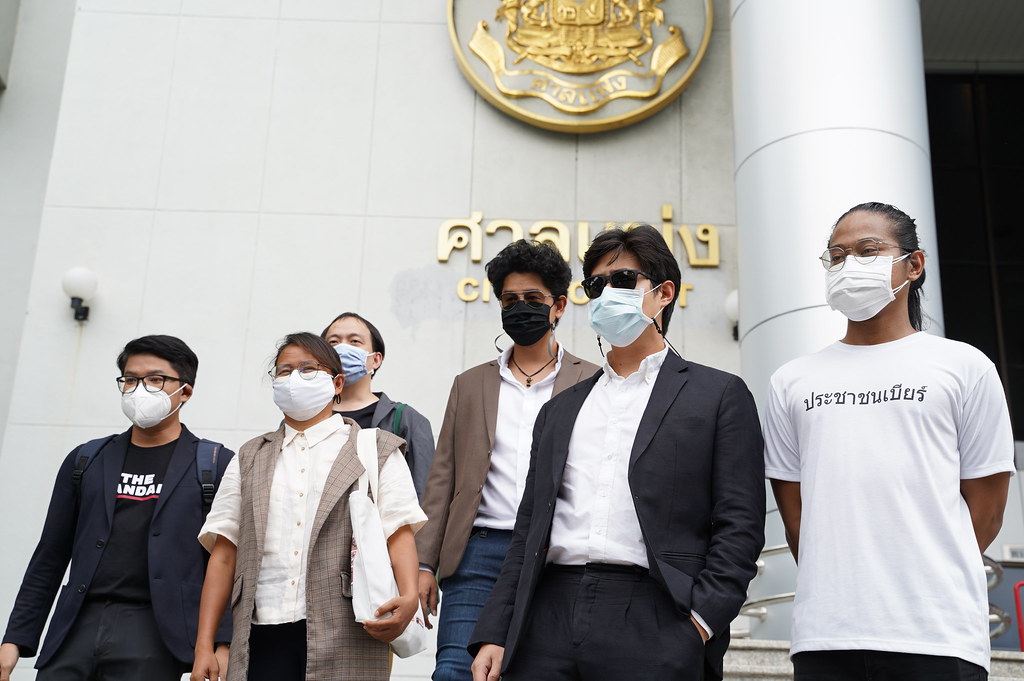On 6 August, the Civil Court ordered the suspension of the 29th order under the Emergency Decree, which bans the distribution of information causing public fear or misinformation by cutting off access to the internet.

Plaintiffs and friends at the front of the Civil Court.
The reason for the court’s decision is that the ban is not limited to misrepresentation, which is given as the justification for the order, and is a deprivation of people's rights and freedoms as protected by the Constitution. The ban is also not compatible with the part of the regulation which indicates the need to "render reasonable the exercise of right and freedom of expression" in accordance with the Constitution.
The Court also said that the order is ambiguous and open to the possibility of a broad interpretation, making the media “unconfident” about expressing opinions, resulting in a superfluous and unnecessary deprivation of the people's rights and freedoms. The order also did not provide guidelines on how officers should perform their duties.
Additionally, Section 9 of the Emergency Decree, under which the order was issued, does not authorize the suspension of internet services for specific IP addresses from which violating information is distributed.
The suspension of internet services, according to the order, is also not limited to one specific act but extended to future acts, hindering communication and information dissemination, therefore contravening Article 36 of the Constitution.
Effective as of 30 July, the order gives the National Broadcasting and Telecommunications Commission (NBTC) the authority to order an internet service provider (ISP) to find out which IP address the offensive information came from and to suspend internet services to that IP address.
The ISP must also inform the NBTC of the IP address and other related information, and the NBTC must inform the national police headquarters in order to press charges. The NBTC may also launch legal proceedings against any ISP who does not follow its order.
The order was criticized by the public due to its ambiguous nature which is open to a wide range of interpretations, paving the way for authorities to use the order as a measure to censor whatever information they see as improper or which has a negative impact on the authorities.
After the court delivered its ruling, 6 media associations, comprising the National Press Council of Thailand, the News Broadcasting Council of Thailand , the Thai Journalists Association, the Thai Broadcast Journalists Association, the Society for Online News Providers and the National Union of Journalists, published a statement urging the government to strictly abide by the Court’s decision.
They also urged the government to consider withdrawing the 29th order and Section 11 of the 27th order that imposes a 2-year jail sentence and/or a fine of up to 40,000 baht for anyone who spreads information or news that causes public fear or affects national security.
Since 2007, Prachatai English has been covering underreported issues in Thailand, especially about democratization and human rights, despite the risk and pressure from the law and the authorities. However, with only 2 full-time reporters and increasing annual operating costs, keeping our work going is a challenge. Your support will ensure we stay a professional media source and be able to expand our team to meet the challenges and deliver timely and in-depth reporting.
• Simple steps to support Prachatai English
1. Bank transfer to account “โครงการหนังสือพิมพ์อินเทอร์เน็ต ประชาไท” or “Prachatai Online Newspaper” 091-0-21689-4, Krungthai Bank
2. Or, Transfer money via Paypal, to e-mail address: [email protected], please leave a comment on the transaction as “For Prachatai English”
